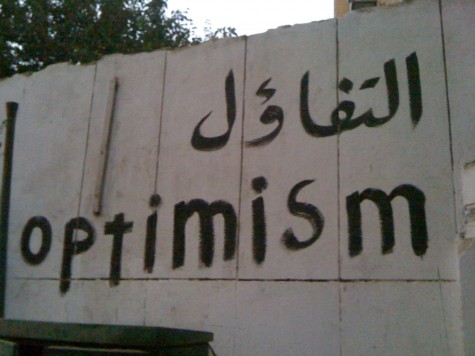By the time you read this, I will have returned from my second of two trips to Egypt. I haven’t been there since 2007. I was of course fascinated to see how (or if) things had changed since the revolution.
The changes weren’t immediately obvious. Same crowds, same pollution, same bad traffic. Worse, in fact, said taxi drivers, because traffic cops weren’t really out in force anymore.
Same hucksters plying Talaat Harb. In fact I got lured into a perfume shop because a guy started talking to me about his experience during the revolution. So adaptable, these guys! Another gambit: “Don’t go that way–it’s closed for a demonstration!”
One concrete change: no more men with giant guns slumped in guard kiosks looking bored. Their presence used to be so common that ‘ZabiT’ (officer) was one of the first words I learned in Arabic class here. In 1992, my friend Karen got a picture of herself posing with some, and captioned it straight from our textbook dialogue: ‘Ma hadha? Hadha ZabiT.’ (What is that? That is an officer.)
And graffiti. Everywhere. Gorgeous and fully formed. Some of it bursting with psychedelic color, some of it in elaborate stencil portraits of the people killed during the revolution. The sad panda of the cheese commercials is slumped on walls everywhere: don’t say no to regime change.
And then there’s simply this:

I would love to end the post on this note, but it would be dishonest. When I first arrived at the end of September, public spaces felt noticeably joyful. Now as elections are getting closer, there’s mounting anxiety. The election system is opaque and disorganized, perhaps intentionally. The Maspero incident proved everyone’s worst fears about the military council. The Salafists are saying (and doing) ridiculous things but getting all the press. Even the graffiti is being painted over, chiseled out and even covered up by campaign posters.
It will be partially resolved in late November, when elections start in Cairo and Alexandria. Meanwhile, people are looking back at their photos from the 18 days of the revolution and recounting their stories, trying to rekindle that optimism. Hanshuf ba’a. We’ll see.